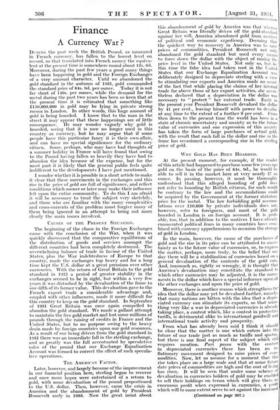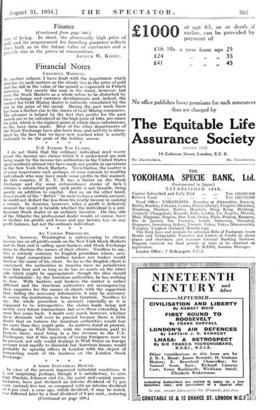Finance
A Currency War ?
DURING the past week the British Pound, as measured In French currency, has fallen to the lowest level on record, so that translated into French money the equiva- lent at the present time is somewhere round about 12s. 6d. Moreover, during the past few years a good many things have been happening in gold and the Foreign Exchanges of a very unusual character. Until we abandoned the gold standard in the autumn of 1931, gold commanded the standard price of 84s. 9d. per ounce. Today it is not far short of 140s. per ounce, while the demand for the metal during the past two years has been so keen that at the present time it is estimated that something like £150,000,000 in gold may be lying in private strong rooms in London. In other words, this 'huge amount of gold is being hoarded. I know that to the man in the street it may appear that these happenings are of little consequence. He may wonder vaguely why gold is hoarded, seeing that it is now no longer used in this country as currency, but he may argue that if some people have this particuiar fancy it is their own affair, and can have no special significance for the ordinary citizen. Some, perhaps, who may have had thoughts of a summer holiday in France will have found that owing to the Pound having fallen so heavily they have had to- abandon the idea because of the expense, but for the most part it is likely that the general public feels quite indifferent to the developments I have just mentioned.
I wonder whether it is possible in a short article to make it clear that these movements in the exchanges and this rise in the price of gold are full of significance, and reflect conditions which sooner or later may make their influence felt upon the entire community. To do this I am afraid it will be necessary to treat the subject very sketchily, and those who are familiar with the many complexities and cross-currents of the problem must forgive many of them being ignored in an attempt to bring out more clearly the main issues involved.
CAUSES OF THE PRESENT SITUATION.
The beginning of the chaos in the Foreign Exchanges came with the conclusion of the War, when it was quickly discovered that the comparative equilibrium of the distribution of goods and services amongst the different countries had been completely destroyed. The overwhelming balance of trade in favour of the United States, plus the War indebtedness of Europe to that country, made the exchanges top heavy and for a long time kept the U.S. dollar at a great premium over other currencies. With the return of Great Britain to the gold standard in 1925 a period of greater stability in the exchanges seemed to be in sight,' but within a very few years it was disturbed by the devaluation of the franc to one-fifth of its former value. This-devaluation gave to the French export trade a considerable advantage and, coupled with other influences, made it more difficult for this country to keep on the gold standard. In September of 1931 Great Britain was once again compelled to abandon the gold standard. We made a gallant attempt to. maintain the free gold-market4nid lost some millions of pounds through the raising of credits in France and the United States, but to no purpose owing to the heavy drain made by foreign countries upon our gold resources. As a result of our being driven from the gold standard in 1931 there was an immediate fall in the sterling exchange, and so greatly was the fall accentuated by speculative sales of the pound that our Exchange Equalization Account was formed to correct the effect of such specula- tive operations.
THE AMERICAN FACTOR.
Later, however, and largely because of the improvement in our financial position here, sterling began to recover and once more hopes were entertained of a return to gold, with some devaluation of the pound proportioned to the U.S. dollar. Then, however, came the crisis in America and the abandonment of gold by President Roosevelt early in 1988. Now the great point about this abandonment of gold by America was that whereas Great Britain was literally driven off the gold standard against her will, America abandoned gold from motives of political and economic expediency. Deeming that the quickest way to recovery in America was to raise prices of commodities, President Roosevelt not only abandoned the gold standard but used every means. to force down the dollar with the object of raising the Price level in the United States. Not only so, but bv this time the false idea had taken root in the United States that our Exchange Equalization Account was deliberately designed to depreciate sterling with a view to stimulating our exports and America made no secret of the fact that - while placing the claims of her internal trade far above those of her export activities, she never- theless declared that a depreciation in the dollar was necessary to " protect " her external trade. Early in the present year President Roosevelt devalued the dollar by 41 per cent., leaving himself with power to devalue at any time to the extent of a further 9 per cent. From then down to the present time the world has been in a state of chronic uncertainty and anxiety as to the future value of currencies and one expression of this anxiety has taken the form of large purchases of actual gold, with the result that each fall in the dollar and rise in the franc has occasioned a corresponding rise in the sterling price of gold.
WHY GOLD HAS BEEN HOARDED.
At the present moment, for example, if the reader of this article had happened to purchase some few years aga gold on the basis of the price of 84s. 9d., he would be able to sell it in the market here at very nearly £7 an ounce. In passing, however, it must be thoroughly understood that this alleged hoarding of gold does not. refer to hoarding by British citizens, for such would be contrary to the law and the accumulations could be acquired by the Government at the former statutory price for the metal. The law forbidding gold accumu- lations over £10,000 by private individuals does not, however, refer to foreigners, and most of the gold hoarded in London is on foreign account. It is prob- able, too, that in addition to the motives I have already enumerated political fears in many countries have com- bined with currency apprehensions to occasion the storage of gold in London.
In the main, however, the cause of the purchases of gold and the rise in its price can be attributed to uncer- tainty as to the future value of currencies, or, to express the matter, perhaps, more truly, to the belief that one day there will be a stabilization of currencies based on a general devaluation of the contents of the gold coin. And, inasmuch as, rightly or wrongly, it is thought that America's devaluation may constitute the standard to which other currencies may be adjusted, it is the move- ments in the dollar which have a special influence upon all the other exchanges and upon the price of gold.
Moreover, there is another reason which strengthens the idea that the dollar may yet be devalued further, namely, that many nations are bitten with the idea that a depre- ciated currency can stimulate its exports, so that some- thing very like a war in depreciated currencies is already taking place, a contest which, like a contest in protective tariffs, is detrimental alike to international goodwill and international trade activity and prosperity. From what has already been said I think it should be clear that the matter is one which enters into the future of our trade just as much as tariffs and quotas. but there is one final aspect of the subject which still requires mention. Pan passu with the contest in depreciated currencies there has been an in- flationary movement designed to raise prices of com- modities. Now, let us assume for a moment that this rise takes place on a large scale and that at some future Adate prices of commodities are high and the cost of living has risen. It will be seen that under some scheme of devaluation in currencies holders of gold may be enabled to sell their holdings on terms. which will give them all enormous profit when expressed in. currencies, a profit which will to some extent serve to set against the increased (Continued on page 807.1 Finance
(Continued from page 306.)
cost of living. In short, the abnormally high price of eold and its acquirement for hoarding purposes reflects fears both as to the future value of currencies and a possible rise in the prices of commodities.
ARTHUR W. KIDDY.







































 Previous page
Previous page